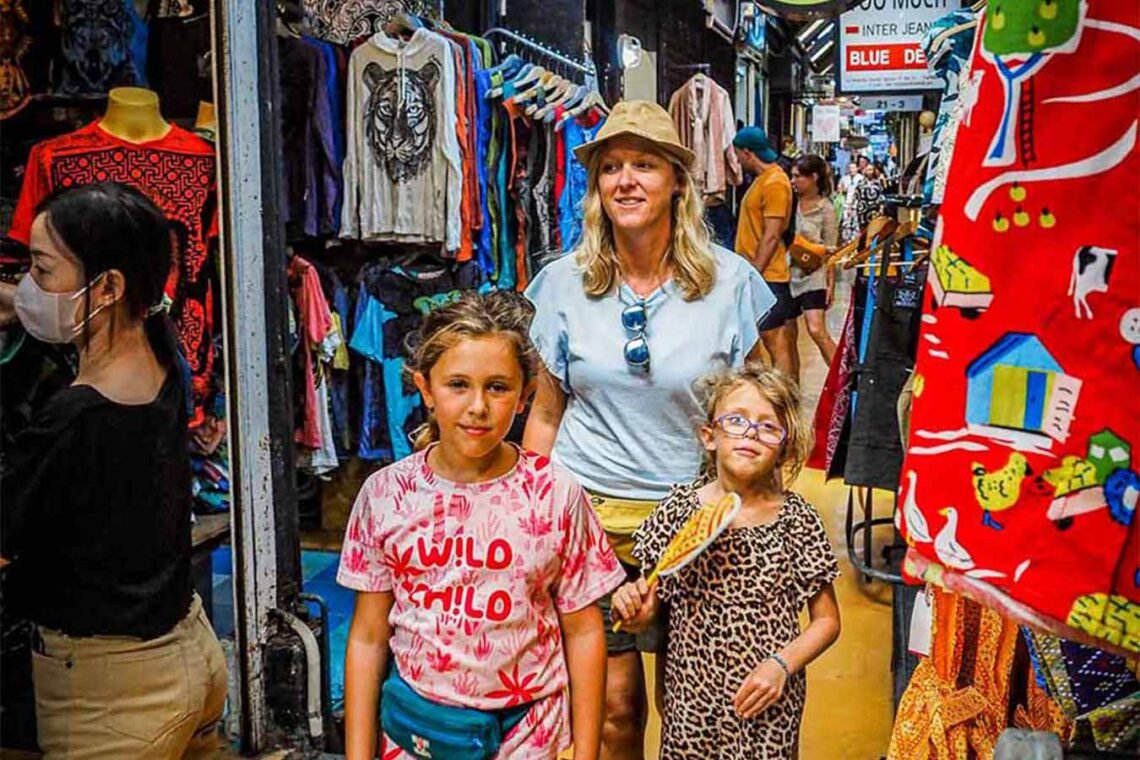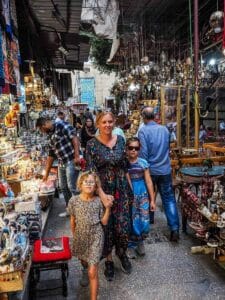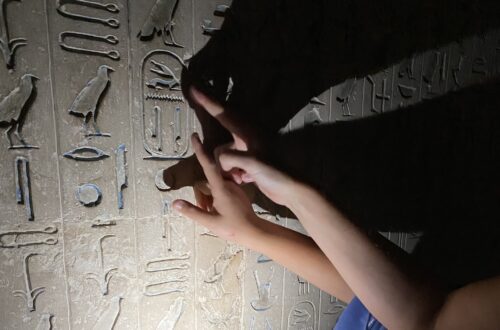
Discover a Bargain; Teaching Your Kids to Haggle
Haggling is a way of life in many African and South East Asian countries but it can feel intimating. We are here to tell you the secrets to a successful haggle and how to get the kids involved.
What is haggling?
Haggling, also known as bargaining or negotiating, is the art of negotiating the price of goods or services between a buyer and a seller to reach a mutually agreed-upon deal. It is a common practice in many cultures, particularly in local and tourist markets, as well as when traveling. Here’s an overview of haggling and how it is used in these contexts:
Haggling in Travel and Local Markets
- Cultural Norms: Haggling is deeply ingrained in the culture of many countries, especially in markets and bazaars. It’s considered a standard way of doing business.
- Flexible Pricing: In these markets, prices are often not fixed, and sellers expect buyers to negotiate. It’s a way for both parties to feel like they’ve struck a fair deal.

Haggling is an amazing skill for kids to learn- it teaches so many valuable skills
- Negotiation Skills: Haggling is essentially a negotiation process. Kids learn how to take time to articulate their needs, make persuasive arguments, and find mutually beneficial solutions. (If only they used this skill as siblings!)
- Financial Literacy: Kids gain a practical understanding of money and value, this is extra complicated when moving to different countries with different currencies, especially when they have so many 0000’s.
- Communication Skills: Communication is crucial in haggling. Kids learn how to express themselves clearly, ask questions, and listen.
- Confidence: We all feel good when we feel like we got a good deal and this is the same for kids but they get the added bonus that they did it themselves. It shows them that they have the ability to influence outcomes through their words and actions.
- Patience and Persistence: Negotiations can sometimes take time. Kids learn patience as they engage in back-and-forth discussions with sellers. They also develop persistence by sticking to their goals and not giving up easily.
- Critical Thinking: Haggling requires kids to think critically about the value of an item and it’s worth to them.
- Math Skills: Calculating prices and making quick mental calculations during haggling exercises can improve math skills. This is the tricky part for our kids and usually the question they ask us.
- Respect and Fairness: Haggling teaches kids the importance of fairness and respecting the rights and feelings of others. They learn that while negotiation is about getting a good deal, it should be conducted with respect and always with a smile.
- Decision-Making: Kids must make choices during haggling, such as whether to accept a counteroffer or walk away from a deal.
- Independence: We encourage our kids to take the first step with haggling if they are interested in buying something.
Bargaining Etiquette
- Do some research. Know the market value of what you see so you can show you know what the price truly should be. Have the conversation about how much do they think it should be, how much do they have to spend and sometimes offer comparable items. If it’s $2 that will be one week’s savings etc.
- Show some interest in the item you fancy, this is where the drama skills come in, even if we love it, we have to pretend it’s just ok. We teach the kids not to be too enthusiastic, more of a maybe I’ll buy it and maybe I won’t attitude.
- Ask the price- but only if you are ready to go into negotiations.
Typically, in SEA prices will be 50% higher than their lowest price.
This is typical but not always the case. You need to consider the value you put on something, if its significantly more, then enter the bargaining arena with at least a 50% drop, but if it’s not far from you ball point, just drop a little. Sometimes, it’s not worth haggling over a few $.
- You will be given a whole lot of reasons why it can’t be sold for that price and you need to give reasons why it can
‘I bought one already’
‘It’s a different quality to the other one’
The kids will also talk about their budget and how much they have to spend on an item.
Thank you and smiles. Whatever deal is made, it is always done with a smile and a thank you.

Top Haggling Tips for Travelers
- Start Low: Begin negotiations with a price lower than what you’re willing to pay. This leaves wiggle room for both of you.
- Be Prepared to Walk Away: Don’t be afraid to walk away if you can’t reach a mutually agreeable price. Say thanks and if they can’t go lower, they will let you walk and if they can, they will call you back.
- Engage in Friendly Banter: Engage in conversations with the seller. Jokes and laughs help build rapport.
- Bundle Purchases: If you’re buying multiple items from the same person, try to negotiate a package deal for a better overall price.
- Check the Goods: Inspect the item closely for quality before agreeing to a price if there are minor flaws you can use that to negotiate.
- Counteroffers: It’s like a game of tennis, the price will go back and forth, stay cool and calm.
- Know When to Stop: Once you’ve reached a price, you’re comfortable with, accept it and complete the transaction. Pushing too hard can backfire.
Haggling as a tourist
- Higher Initial Prices: Sellers in tourist markets often set higher initial prices, knowing that tourists may be willing to pay more.
- Tourist vs. Local Prices: Locals may pay less for the same items. This is a common practice, so don’t be discouraged when you see different pricing.
- Negotiate Wisely: Tourist markets can be crowded and overwhelming. Maintain your composure and use your negotiation skills to your advantage.
This is a great activity which we use on our worldschooling journey.

What is worldschooling?
Worldschooling is an educational approach that involves traveling the world as a means of learning. It is often associated with experiential learning, which emphasizes learning through direct, hands-on experiences rather than traditional classroom-based education. Here’s a closer look at worldschooling Unlocking new horizons- how travel enriches your child’s education and why experiential learning can be highly beneficial. Watch out, here comes the teacher talk:
Experiential Learning:
- Active Engagement: Experiential learning engages students actively in the learning process. Instead of passive absorption of information, students actively participate, which often leads to better retention and understanding.
- Relevance: It makes learning more relevant to real-life situations. When students apply what they learn to actual experiences, they see the practical applications of their knowledge.
- Critical Thinking: Experiential learning promotes critical thinking and problem-solving skills. When faced with real challenges, students learn to think on their feet and find creative solutions.
- Emotional Connection: Experiential learning often creates emotional connections to the subject matter. When students have a personal stake or connection to what they’re learning, they are more motivated and engaged.
- Multisensory Learning: It engages multiple senses, making learning more immersive and memorable. Hands-on experiences, field trips, and interactive activities stimulate various sensory pathways, enhancing understanding and memory.
- Long-Term Impact: Experiential learning experiences tend to have a lasting impact. People often remember what they’ve done and experienced more vividly than what they’ve read or heard about.
Want to know about the worldschooling community or looking for more information to guide your own worldschooling adventures?

Connect with our worldschooling coach.
Are you a parent with a desire to give your children an education that transcends the walls of a traditional classroom? Are you considering extended travel, a family gap year or a Worldschooling journey?
If you’re eager to start on this incredible adventure, you’re in the right place.











